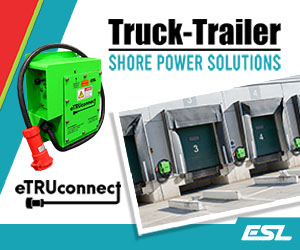
Pending TRU regulations will require that diesel engines be phased out over the next six years in an effort to help improve the environmental impact of the trucking industry. Facility and fleet operators should consider options to reduce emissions at their facilities.
Truck Refrigeration Units, commonly referred to as TRUs, are refrigeration systems that are typically powered by internal combustion engines. TRUs control the environment of temperature-sensitive products that are transported in refrigerated trucks, trailers, railcars and shipping containers. TRUs are used to transport and store many products such as food, pharmaceuticals, plants, medicines, and chemicals.
Some companies use TRUs for extended cold storage. Distribution centers and grocery stores may run out of cold storage space in their buildings and then opt to store overflow goods in TRU-equipped trucks and trailers outside their buildings. Distribution centers, truck stops and other cold storage facilities also attract large volumes of TRUs that contribute to higher localized health risks. New regulations are developing concepts to reduce emissions from facilities with TRU activity by transitioning to zero-emission operation where practical.
According to SCE.com, Southern California Edison is aiding in these pending regulations by offering a program designed to help qualifying SCE commercial customers install the charging/powering infrastructure needed to electrify medium- and heavy-duty fleets. SCE’s Charge Ready Transport Program is providing a funding initiative for installation of infrastructure to SCE commercial customers. Through this program, SCE’s goal is to advance the vision for a clean energy future while providing medium- and heavy-duty fleet owners the opportunity to save money. The program is offering opportunities such as, no-cost installation of electric infrastructure or giving businesses the option to install, own, operate and maintain the infrastructure on site for a rebate at 80% of cost. SCE is also offering special incentives such as commercial rate options that make EV charging and TRU shore power more affordable during certain times of the day.
In addition to SCE’s infrastructure programs, CARBs Clean Off-Road Equipment Voucher Incentive Project (CORE) offers a streamlined voucher process for buyers to receive funding to offset the adoption costs of clean, commercial ready zero-emission equipment including transport refrigeration units, cargo-handling equipment, and more. CARB also offers eligibility opportunities to offset electricity costs through the Low Carbon Fuel Standard (LCFS) Program which is designed to encourage the use of cleaner low-carbon fuels in California, encourage the production of those fuels, and therefore, reduce greenhouse gas emissions.
Charge Ready Transport, LCFS and CORE are some of the many incentives available in California that provide opportunities to reduce your organization’s carbon footprint and improve the air quality of your community all while cutting operation and maintenance costs to your fleet.
Get ahead of the competition; learn more about SCE’s Charge Ready Transport and reducing greenhouse gas emissions here: https://www.sce.com/business/electric-cars/charge-ready-transport.
If you’re interested in learning how ESL can help provide safe utility power to electric or hybrid TRUs check out our eTRUconnect: https://eslpwr.com/etruconnect/

